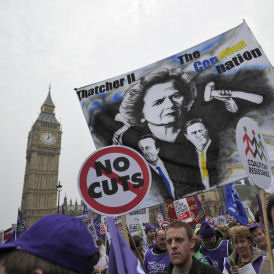Mass strikes loom after civil service union vote
As hundreds of thousands of public sector workers prepare to strike on 30 June, a union leader and a Government minister clash over the strikes live on Channel 4 News.
The Public and Commercial Services union (PCS) has voted by 61 per cent to go on strike in a row over pensions, job cuts and pay freezes. The turnout was 32 per cent.
The PCS joins two teachers’ unions which voted to go on strike on 30 June on Tuesday and a further education union which was balloted for strike action earlier this year. Millions of people across England and Wales, including school pupils, will be affected by the national strikes.
The PCS leader Mark Serwotka has warned that up to 750,000 public sector workers could take co-ordinated strike action on the same day, making it the biggest day of industrial action for years.
The workers will stage a 24-hour walkout, and the civil servants will follow it up with a month-long ban on overtime.
In total, around 600,000 people were eligible to vote for strike action across the four unions: the PCS, the National Union of Teachers (NUT), the Association of Teachers and Lecturers (ATL), and the University and College Union.

Other groups, including direct action campaigner UK Uncut, and students are also planning protests on 30 June to coincide with the strike. The Prison Officers Association said every prison and secure hospital POA branch in England, Wales, Scotland and Northern Ireland will also hold protest meetings on the same day.
Mr Serwotka warned that if the Government did not change course, the huge numbers striking this month would grow to “three to four million” by October.
Predicting that this would be the first of a series of strikes, Mr Serwotka said that other public sector unions – including Unison and Unite – would join the PCS, NUT and ATL in taking action later in the year unless the Government agreed to talk to the unions and compromise on its proposals.
“So the Government should understand this is going to grow and grow,” he claimed.
But Ministers say the low turnout in the strike ballot shows that the union’s members do not support such action.
On-air clash
Appearing on Channel 4 News, the union leader clashed with the Cabinet Office Minister, Francis Maude.
Mr Maude said the Government was committed to retaining a defined benefit pension scheme for civil servants which was more generous than that enjoyed by many people in the private sector.
“They have been pretty much eradicated in the private sector and other taxpayers, who are paying contributions every year through their tax, pay for these public sector pension schemes,” said Mr Maude.
“They are going to be pretty fed up with the idea that Mark is boasting about how he is going to close down job centres, close down services which some of the most vulnerable people in our society depend, in order to promote people paying more for the public sector pensions that his members are going to enjoy, which actually most people in the private sector have no prospect of enjoying themselves.”
Mr Serwotka said that he had been negotiating with Ministers for four months, without any sign of compromise from the Government side.
“You can talk as long as you like, but they are implementing the cuts,” he said. “If nothing is changed, we clearly have the right to take industrial action.”
Read more: Strike threat sparks row over who's got the biggest mandate
Other union bosses have warned of more strikes to come. There could be a series of strikes over the Wimbledon tennis championships by tube workers in London after talks broke down with the RMT union.
And Unison General Secretary Dave Prentis has warned that 1.2 million local authority, NHS and other public sector workers are “on the road” to strikes in the autumn over pay freezes and pension changes.
There will be further talks between the Government and union leaders on 27 June.
Please note: Workers at the air traffic control company NATS, while members of the PCS union, were not balloted and will not be on strike.